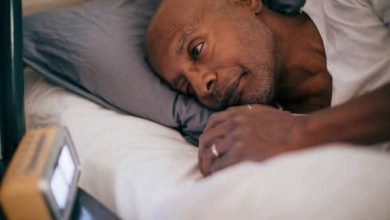Why is my Hair Thinning Out? – BlackDoctor.org


Ellis Dean discusses hair loss and some of its causes and possible remedies with Dr. Brooke.
BDO Ellis Dean: Good evening, good evening. And welcome to operation life back to the basics. Some something that really impacts black people, but not too much to the point of death, but something that is very, very important to us is our skin and our hair.
Is hair loss just hereditary? Is it stress? What causes this, because I saw this statistic that said up to a third or a half of black women suffer some amount of hair loss in their lifetime. That’s a lot. So what is the reasoning? What’s going on and why is all that happening?
Dr. Brooke Jackson:
Hair loss means alopecia, but there are many different types of alopecia. And so generally we divide alopecia into two broad categories, scarring and non scarring, and there are lots of reasons for both.
And so we’ll talk a little bit about non scarring alopecia. Those are the types that is the type of hair loss. What typically what people will experience some shedding. Um, you can have them as related to medication. A lot of blood pressure medications will do this. You can have this. If it relates to any kind of autoimmune condition, people who have thyroid problems may have this people who are on chronic redness zone like transplant patients can have hair loss as well. Here. It becomes very thin and fragile. There are several that are related to stress. One is called alopecia. Areata. That’s typically where you get these little round patches of hair loss. A lot of times men will have it in the beard women and children, and everyone will have it on the scalp as well, but absolutely associated with stress.
And that is 100% stress associated. And it is very classic and predictable three months after a stressful event. And so when we talk to people about what’s going on with their hair, it’s not in this moment but more like, what was going on with you three months ago.
BDO Ellis Dean:
So with, you know, so we know as, as black people in this country, there is this kind of daily stressor that happens in terms of like, what happens if you know, a police officer gets behind you, we’ve got these microaggressions that happened at work, you know, all of these kind of subtle things that happen just day to day. Um, I don’t wanna say racism, but just day-to-day reminders of, of this kind of black existence in this country, is that a contributing factor? Could that be kind of a prolonged, which is why you see a lot of, you know, especially men, experienced hair loss in their lifetime?
Dr. Brooke Jackson: I think particularly brown people have become so accustomed to these microaggressions that it, you have to learn how to survive. We’re in survival mode all the time. And then you had COVID and then you add whatever else is going on in your life. And so you have just become numb really to the level of stress in your body, because you’re just trying to survive it. That doesn’t mean it doesn’t exist. So it’s not no longer level 10, which it would be for somebody else for now, for you. It’s a level two. Right. But it’s still stressful. It is all exacerbated by stress.
We didn’t really talk about scarring alopecia, but I will talk about that for a minute because what scarring alopecia, disproportionately affects African-American women. That is devastating. When I see patients come in that have been hiding their hair loss. And so, you know, as I mentioned earlier, as soon as you see something do something, right? So that’s two with the hairstylist. We want to educate our hairstylists because they’re looking at the top of your head. And I think sometimes I’ve had patients who blame their hairstylists for their hair loss. And that’s not the case. It’s, you know if it’s right. So, so there are definitely some things that will make it worse, but your hairstylist is the one who’s looking at the top of your scalp, who can see if it’s red can see if there are bumps can see if you’re tender. None of those things are normal.
It is not normal for you to have an itchy scalp. It is not normal for you to have bumps on your head. It is not normal for your scalp to be red. And so when you play it off, you’re like, oh, you know, that’s just the way it’s supposed to be. No, it’s not. Those are all signs of inflammation. Chronic inflammation is the root of all disease, regardless of where it is on your body. Yes. Your hair follicles are chronically inflamed. That is going to turn into scarring. That means your hair follicles are gone here. Follicles are limited resource. They do not regenerate. We don’t get more. We are born with a hundred thousand hair follicles on our head, that’s it? And so when our hair follicles die, when they get scarred down, we have to bid those goodbye. Right. So we then focus on trying to make sure that the process does not continue and damage the residual hair follicles that we have.
BDO Ellis Dean:
There’s a lot of people that ask about hair loss. I will ask this question to say, how do you know if your hair follicles are dead? Can they be revived? Can it be revised once a hair follicle is dead?
Dr. Brooke Jackson:
Correct. Now, um, in answer to your question, how do you know? Right? Not like you can see it, right? It’s not like you can walk by a dead person on the street and like, well, you’re dead. Right? So, um, I often tell patients with, um, and there’s a difference between scarred down here follicles and miniaturized here felt this, made your eyes hair follicles. That is what happens with pattern, hair loss, where they, your follicle becomes finer, finer, finer. And so that’s why as people are going through pattern, hair loss, the hair becomes thinner, thinner, finer, finer, fine, or to the point where you can’t even really see it anymore. Okay. With scarring hair loss. And it gets back to the secretary of scarring, alopecia or lupus that you have an inflammatory process. If the inflammation is around the hair follicle and it is not resolved. And so this doesn’t mean that just because you have an inflammatory hair loss that you are doomed, right. What I, the take home message here is don’t sit in the mirror and look at it, put your dermatologist on speed, dial and get an appointment. Okay. As with any disease process, the earlier the intervention, the better the results.
You know, if you go and get a weave and you see a little bit of irritation or redness around your edges, well, number one, don’t get back and go back to that person and get a weave again, but do go see a dermatologist, right? So don’t continue to cover it up. And that’s where patients will get the weave and the wigs, all this they’re covering it up. I’m like deal with it And there are treatments, there are lots of treatments now. And so again, the earlier we can intervene, the better the results are going to be.
And so as far as the hair loss dead, you can’t see that with a naked eye, right? What you can appreciate is thinning hair, but often we will do a biopsy and I’ve had a lot of patients who’ve come in and, you know, they’re pretty hopeless and I’m really trying to manage their expectations and we get them going on treatment. And I’m pleasantly surprised that they recover. I am. So, you know, it’s, it’s never too late.
For more information on this Facebook live topic click the link. Learn how best to address hair loss and what you can do to save or prevent it.
https://www.facebook.com/BlackDoctor.org/videos/835376750477544




